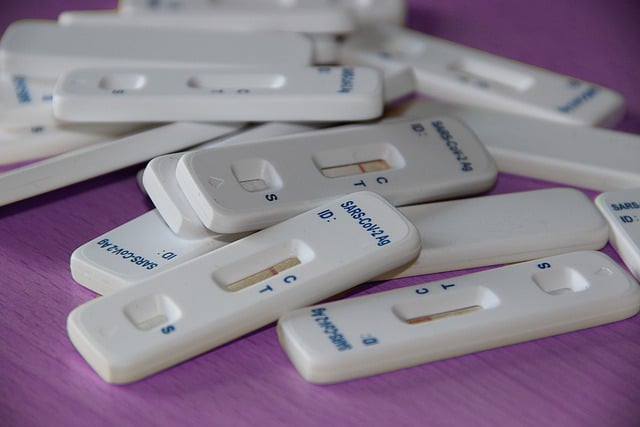Hormone imbalances, caused by factors like stress, lifestyle, age, and medical conditions, are a significant cause of fertility issues in the UK. Awareness of hormone health is growing, emphasizing the importance of tests like the Vitamin D Blood Test for identifying imbalances affecting ovulation, menstrual cycles, and overall reproductive health. Healthcare professionals use hormone analysis to diagnose problems like PCOS and male infertility, providing personalized care through lifestyle changes, medication, or supplements to correct specific hormonal imbalances.
Infertility affects millions, often stemming from hormone imbalances that impact fertility. Understanding these intricate hormonal dynamics is crucial for effective treatment. This article delves into the world of hormone analysis as a diagnostic tool for reproductive issues, shedding light on how it can unravel the complexities of fertility challenges.
From exploring vitamin D’s role in UK blood tests to understanding treatment options, readers will gain valuable insights into navigating hormonal health for better reproductive outcomes. Specifically, we focus on the significance of UK Vitamin D blood tests in identifying and addressing potential roadblocks to conception.
- Understanding Hormone Imbalances and Their Impact on Fertility
- The Role of Vitamin D in Reproductive Health: A UK Blood Test Perspective
- Diagnosing and Treating Reproductive Issues with Hormone Analysis
Understanding Hormone Imbalances and Their Impact on Fertility
Hormone imbalances can significantly impact fertility, and identifying these issues through analysis is a crucial step in understanding and treating reproductive challenges. Hormones play a vital role in regulating various bodily functions, including ovulation and the menstrual cycle. Imbalances often occur when there’s a disruption in the delicate hormonal equilibrium, affecting the likelihood of conception. In the UK, awareness about the importance of hormone health is growing, with even something as simple as a Vitamin D Blood Test gaining popularity.
These imbalances can stem from various factors, such as stress, lifestyle choices, age, or underlying medical conditions. For instance, elevated levels of cortisol, often referred to as the ‘stress hormone’, can interfere with ovulation and lead to reduced fertility. Similarly, an imbalance in estrogen and progesterone levels can disrupt the menstrual cycle, making conception more difficult. Understanding these connections is essential for healthcare professionals when assisting individuals or couples facing fertility challenges.
The Role of Vitamin D in Reproductive Health: A UK Blood Test Perspective
Vitamin D, often referred to as the ‘sunshine vitamin’, plays a surprising yet significant role in reproductive health. Recent studies have highlighted its importance in regulating various hormonal processes crucial for fertility and healthy pregnancies. In the UK, where sunlight exposure varies throughout the year, ensuring adequate Vitamin D levels is essential for individuals seeking to address reproductive issues.
The UK Vitamin D Blood Test has become a valuable tool in assessing reproductive health. This test measures the concentration of 25-hydroxyvitamin D (25(OH)D) in the blood, providing insights into an individual’s Vitamin D status. As research continues to uncover the links between Vitamin D deficiency and reproductive challenges, such as polycystic ovary syndrome (PCOS) and male infertility, healthcare professionals increasingly recognize the need for early detection and intervention through this simple yet powerful blood test.
Diagnosing and Treating Reproductive Issues with Hormone Analysis
Diagnosing and treating reproductive issues often involves a detailed look at hormone levels. Hormone analysis is a powerful tool that helps healthcare professionals uncover underlying causes of infertility, menstrual disorders, and other related problems. By examining hormones like estrogen, progesterone, and testosterone, doctors can identify imbalances or anomalies that may be contributing to these conditions. This precise approach allows for tailored treatments, including lifestyle changes, medication, or even specialized procedures.
In the UK, a Vitamin D Blood Test is one example of how hormone analysis can provide valuable insights. Vitamin D plays a crucial role in reproductive health, and its deficiency has been linked to various fertility issues. A simple blood test can measure Vitamin D levels, helping doctors assess potential deficiencies and prescribe appropriate supplements if needed. This proactive approach ensures that patients receive personalized care, addressing specific hormonal imbalances that may have gone unnoticed otherwise.
Hormone analysis plays a pivotal role in diagnosing and treating reproductive issues, offering insights into vitamin D levels, which are crucial for fertility. In the UK, a simple vitamin D blood test can provide valuable data, aiding healthcare professionals in tailoring treatments to address hormone imbalances. By leveraging these analyses, individuals can navigate their reproductive journeys with enhanced understanding and improved outcomes.
